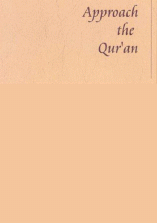Approach the Quran

AL-Qu.rtubi's Discussion on the Ways of Reading the Qur'an
ln the introduction of his well-known Tafsir (exegesis), Imam Al-Qurtubi discussed the ways of reading the Glorious Qur'an and highlighted the legal ruling regarding each way, as follows:
Anas (may Allah be pleased with him) was asked, "How was the recitation (of the Qur'an) of the Prophet?" He replied, "It was characterized by the prolongation of certain sounds." He then recited, (In the Narne of Allah, Most Gracious, Most Merciful,) prolonging the pronunciation of 'Allah,' 'Most Gracious} and 'Most Merciful'.[1]
Umm Salamah (may Allah be pleased with her) said that the Messenger of Allah (peace be upon him) used to stop after reading each verse of the Qur'an. ln this way he used to say: (In the name 0f Allah, Most Gracious, Most Merciful,) and then stops, and to say: (Praise be to Allah, the Cherisher and Sustainer of the worlds, ) and then Stops, and to Say: (Most Gracious, Most Merciful,) and then stops, and to say: (Master of the Day of Judgment[2]
The Prophet (peace be upon him) said,
"The best voice of the people in reciting the Qur'an is that of a man who, when reading the Qur'an, you notice his consciousness of Allah."[3]
Qays ibn `Abbad reported that the Companions of the Messenger of Allah (peace be upon him) used to abhor raising their voices when remembering Allah, Most High. Many scholars have maintained the abhorrence of reading the Glorious Qur'an loudly such as Sa`id ibn Al-Musayib, Sa` id ibn Jubayr, Al-Qasim ibn Muhammad, Al-Hasan, Ibn Sirin, An-Nakh`i, Malik ibn Anas, and Ahmad ibn Hanbal
Once Malik was asked about reciting the Glorious Qur'an loudly in Prayer and he declared his extreme abhorrence of this.
In contrast, other scholars permit reading the Glorious Qur'an loudly. They base their view on the fact that a sweet voice is more influential on and attractive to the hearts. In support of their view, the proponents of this stance quote the following hadiths:
On the authority of Al-Bara' ibn `Azib (may Allah be pleased with him) that the Messenger of Allah (peace be upon him) said,
"Adorn the Qur'an with your voices."[4]
Furthermore, the Messenger of Allah (peace be upon him) declared,
"He is not one of us (Muslims) who does not try to read the Qur'an with a sweet voice. "[5]
Abu Burda narrated on the authority of Abu Musa that the Messenger of Allah (peace be upon him) said to Abu Musa,
"If you were to see me, as I was listening to your recitation (of the Qur'an) last night (you would have felt delighted). You are in fact endowed with a sweet voice like that of Dawud hirnself "
Thereupon, Abu Musa (may Allah be pleased with him) replied, "If I had known that you were listening to me, I would have read it with an even sweeter voice."[6]
`Abdullah ibn Al-Mughaffal Al-Muzani said, "I saw Allah's Messenger on the day of the Conquest of Makkah, riding his she-camel and reciting surat Al-Fath. He recited it in a
Vibrating and pleasant voice."[7]
The above view, however, is maintained by Abu Hanifah, Ash-Shafi'i, Ibn Al-Mubarak, An-Nadr ibn Shmil, Abu Ja`far At-Tabari, Abu Al-Hasan ibn Battal, and Abu Bakr ibn Al-Arabi.
Al-Qurtubi, all in all, gives preference to the former opinion over the latter.
In this connection, Abu Hurayrah (may Allah be pleased with him) said that he heard the Messenger of Allah (peace be upon him) say,
(Allah does not listen. to anything, (more approvingly) as He listens to a Prophet reciting loudly the Quran with a sweet voice. "[8]
Abu Al-Hasan ibn Battal has confirmed the latter opinion and quoted the following hadith in support of his view,
"Learn the Qur'an, read it with a sweet voice, and write it down". [9]
[1] Reported by Al-Bukhari.
[2] Reported by At-Tirmidhi.
[3] Al-Haythami. Az-Zwaid, vol. 7, p. 70.
[4] Reported by Abu Dawud and An-Nsa'i.
[5] Reported by Muslim.
[6] Reported by Al-Bukha.ri and Muslim.
[7] Reported by Al-Bukhari.
[8] Reported by Muslim.
[9] As-Syuti. Al-Jam Al-Kabir, No. l2658.
